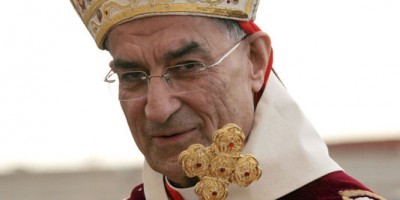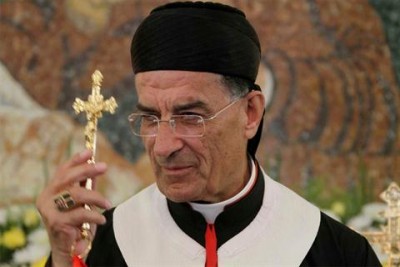 The Patriarch of the Christian Maronites Beshara Boutros al-Rai condemned on Sunday the vacuum in the presidency and said that Speaker Nabih Berri should call for daily sessions until a new Lebanese president is elected .
The Patriarch of the Christian Maronites Beshara Boutros al-Rai condemned on Sunday the vacuum in the presidency and said that Speaker Nabih Berri should call for daily sessions until a new Lebanese president is elected .
He also condemned the failure of the parliament to elect a president describing it as a “great shame”.
He highlighted the role the Lebanese presidents play in creating regional stability.
“Berri should call on the parliament to hold daily electoral sessions, which are now mandatory according to the constitution,” Rai said during his Sunday sermon.
“Through daily voting and debate an agreement could be reached on election of the most suitable president for the state of Lebanon today.”
He added that Lebanon has an important message to deliver, as the region’s main multi confessional country, and said that a Maronite Christian president who can ensure this role should be elected without any further delay.
“On this Sunday, on which we contemplate the message of the church and Christianity , we must preserve Lebanon’s message. Lebanon’s political and social message… is based on the country being a place of humanitarian and national unity among various religious and cultural… groups.” Rai said
“Only a consensual Maronite Christian president endowed with a strong personality, strong morals, impartiality, and a clean record can form a guarantee for that universal Lebanese characteristic.” He stressed
“For this reason we insist on his election today, not tomorrow. Every delay, procrastination or obstruction shakes the aforementioned Lebanese entity and paralyzes Lebanon’s contribution to regional peace and stability.”
The Lebanese lawmakers failed to elect a president on Wednesday, for the eighth time, to succeed president Michel Suleiman whose term ended on may 25. This failure has resulted in prolonging a political vacuum as the country struggles with violence, economic decline and an influx of Syrian refugees.
The civil war in neighbouring Syria has aggravated long-standing rivalries in Lebanon, where political power is divided among religious communities – the presidency goes to a Maronite Christian, the parliament speaker is a Shi’ite Muslim and the prime minister a Sunni.
Political groups have boycotted sessions in recent weeks and blamed each other for the deadlock.
Some of Lebanon’s deepest political divisions come over the handling of the Syrian crisis, which has driven over 1 million refugees into Lebanon.
Politicians from the March 8 coalition, which includes Shi’ite Muslim group Hezbollah, support Syrian President Bashar al-Assad. The rival March 14 coalition backs Assad’s opponents.
The deadlock comes at a time of worsening security. Three suicide bomb attacks late last month targeted Beirut and a checkpoint on the road to Syria. The Syrian crisis and the political stalemate have also hit the Lebanese economy, prompting the central bank to introduce stimulus packages.
Prime Minister Tammam Salam’s government has taken over some presidential duties until a new president is chosen.
The presidency was once the leading political office in Lebanon, but that power was eroded under the agreement which ended the country’s civil war, handing greater influence to the speaker and prime minister.

